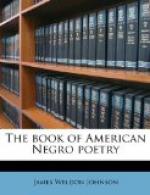Now, these dances which I have referred to and Ragtime music may be lower forms of art, but they are evidence of a power that will some day be applied to the higher forms. And even now we need not stop at the Negro’s accomplishment through these lower forms. In the “spirituals,” or slave songs, the Negro has given America not only its only folksongs, but a mass of noble music. I never think of this music but that I am struck by the wonder, the miracle of its production. How did the men who originated these songs manage to do it? The sentiments are easily accounted for; they are, for the most part, taken from the Bible. But the melodies, where did they come from? Some of them so weirdly sweet, and others so wonderfully strong. Take, for instance, “Go Down, Moses”; I doubt that there is a stronger theme in the whole musical literature of the world.
[Illustration: Music (Oppressed so hard they could not stand, Let my people go. Go down, Mo-ses, way down in E-gypt land, Tell ole Pha-raoh, Let my people go.)]
It is to be noted that whereas the chief characteristic of Ragtime is rhythm, the chief characteristic of the “spirituals” is melody. The melodies of “Steal Away to Jesus,” “Swing Low Sweet Chariot,” “Nobody Knows de Trouble I See,” “I Couldn’t Hear Nobody Pray,” “Deep River,” “O, Freedom Over Me,” and many others of these songs possess a beauty that is—what shall I say? poignant. In the riotous rhythms of Ragtime the Negro expressed his irrepressible buoyancy, his keen response to the sheer joy of living; in the “spirituals” he voiced his sense of beauty and his deep religious feeling.
Naturally, not as much can be said for the words of these songs as for the music. Most of the songs are religious. Some of them are songs expressing faith and endurance and a longing for freedom. In the religious songs, the sentiments and often the entire lines are taken bodily from the Bible. However, there is no doubt that some of these religious songs have a meaning apart from the Biblical text. It is evident that the opening lines of “Go Down, Moses,”
“Go down, Moses,
’Way down
in Egypt land;
Tell old Pharoah,
Let my people
go.”
have a significance beyond the bondage of Israel in Egypt.
The bulk of the lines to these songs, as is the case in all communal music, is made up of choral iteration and incremental repetition of the leader’s lines. If the words are read, this constant iteration and repetition are found to be tiresome; and it must be admitted that the lines themselves are often very trite. And, yet, there is frequently revealed a flash of real, primitive poetry. I give the following examples:
“Sometimes I feel like an eagle in de air.”
“You may bury me in de East,
You may bury me in de West,
But I’ll hear de trumpet
sound
In-a dat mornin’.”




